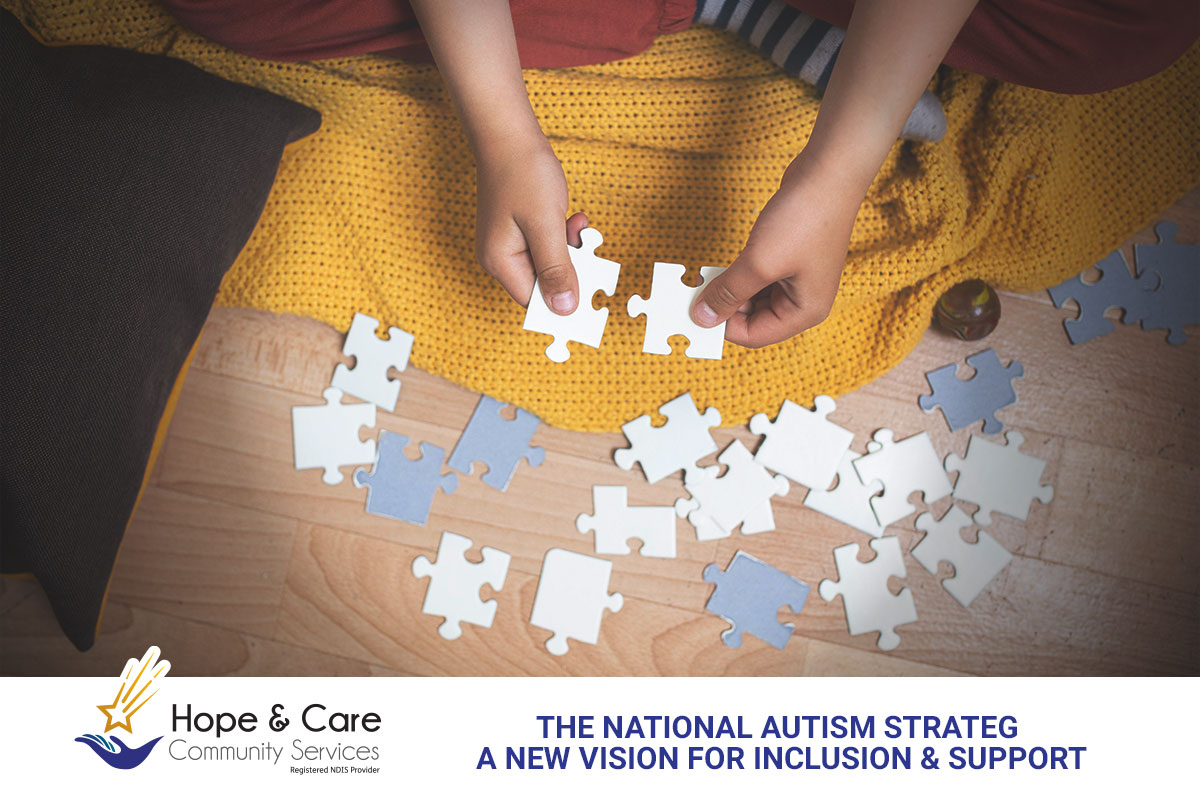
The National Autism Strategy, introduced by the Australian Government in January 2025, is a ground breaking initiative designed to enhance the lives of nearly 300,000 Autistic individuals across Australia. This comprehensive plan aims to remove barriers, increase opportunities and create a more inclusive society where Autistic individuals can fully participate in all aspects of life.
Key Focus Areas of the National Autism Strategy
The National Autism Strategy identifies four critical areas that require immediate attention. By addressing these issues, the government aims to improve autism support services, promote economic inclusion and enhance healthcare accessibility.
Social Inclusion: Creating an Autism-Friendly Society
Social inclusion plays a crucial role in improving the quality of life for Autistic individuals. To foster a more accepting and inclusive society, the government plans to:
- Launch public education campaigns to increase autism awareness.
- Promote community programs that encourage participation and social interaction.
- Develop sensory-friendly environments to accommodate individuals with sensory sensitivities.
By reducing stigma and increasing awareness, this initiative ensures that Autistic individuals feel welcomed, valued and fully included in their communities.
Economic Inclusion: Expanding Employment Opportunities
Autistic individuals often face challenges in securing stable employment due to workplace biases, lack of accommodations and limited access to job opportunities. To tackle these issues, the government will:
- Strengthen inclusive hiring practices and workplace accessibility.
- Expand vocational training programs tailored to Autistic job seekers.
- Provide on-the-job support to help Autistic individuals succeed in their careers.
By removing employment barriers, this initiative aims to increase workforce participation, promote financial independence and empower Autistic individuals in the job market.
Improving Autism Diagnosis and Support Services
A timely and accurate autism diagnosis is essential for accessing appropriate support services. However, many individuals experience long wait times, high costs and confusion about available resources. To address this, the strategy will:
- Streamline the diagnostic process to make assessments faster and more accessible.
- Offer clear guidance and support resources for families navigating autism diagnosis.
- Ensure all services follow a neurodiversity-affirming approach, which respects individual strengths and abilities.
By improving access to autism diagnosis and tailored support services, the government ensures that Autistic individuals receive the help they need at every stage of life.
Enhancing Autism Health and Mental Health Services
Autistic individuals often experience higher rates of mental health conditions and struggle to find healthcare professionals who understand their unique needs. To improve health outcomes and access to autism-friendly healthcare, the strategy will:
- Train healthcare providers to develop autism-inclusive practices.
- Expand mental health support services for Autistic individuals.
- Implement a National Roadmap for Autism Health and Mental Health to improve services across Australia.
These improvements will help Autistic individuals access appropriate healthcare services, reduce health disparities and improve overall well-being.
The First Action Plan (2025-2026): Immediate Steps for Change
To begin implementing the National Autism Strategy, the government introduced the First Action Plan for 2025-2026, backed by $42.3 million in funding. This plan outlines the most urgent priorities and sets the foundation for long-term improvements in autism support services.
Expanding Peer Support Networks
With $19.9 million allocated over four years, the government will:
- Create peer-led support networks to offer guidance from individuals with lived experience.
- Develop culturally inclusive programs to meet the diverse needs of Autistic individuals.
- Provide mentorship and community support to improve social connections.
These peer networks will help reduce isolation and provide practical support for Autistic individuals.
Increasing Autism Awareness and Education
To promote public understanding of autism, the government has committed $915,000 over two years to:
- Launch educational campaigns that challenge stereotypes about autism.
- Train teachers, employers and healthcare workers on autism inclusion.
- Develop community programs that foster respect and acceptance.
By increasing autism awareness, this initiative will create a society that respects and values neurodiversity.
Improving Employment Support for Autistic Individuals
Recognising the high unemployment rates among Autistic individuals, the government will invest $915,000 over two years to:
- Expand job placement programs tailored to Autistic job seekers.
- Support businesses in creating autism-friendly workplaces.
- Provide on-the-job training and mentoring to help Autistic employees succeed.
By promoting workplace inclusivity, this initiative will help more Autistic individuals find stable employment and achieve financial independence.
Establishing a Knowledge Translation Body
To ensure autism-related research translates into real-world solutions, the government will invest $12.2 million over five years to:
- Convert academic research into practical resources for educators, healthcare workers and policymakers.
- Provide evidence-based training for service providers to improve autism support.
- Ensure autism services remain up to date with the latest scientific research.
By bridging the gap between research and practice, this initiative will enhance the quality of autism support services across Australia.
Conducting a National Autism Prevalence Study
For the first time, the government will conduct a nationwide autism prevalence study, investing $2.8 million over four years. This study will:
- Provide accurate data on the number of Autistic individuals in Australia.
- Help policymakers develop better support systems based on real data.
- Identify gaps in autism services and resources.
By gathering reliable data, this study will ensure future autism policies meet the actual needs of the autism community.
Building an Inclusive Future: What’s Next?
The National Autism Strategy represents a major step forward in creating a more inclusive and supportive Australia. By focusing on social inclusion, economic participation, improved services and better healthcare, the government is building a future where Autistic individuals can thrive.
At Hope & Care Community Services, we are committed to supporting this vision.
As the government implements the National Autism Strategy, we encourage communities, businesses and policymakers to work together. By fostering acceptance, accessibility and inclusion, we can build a society where Autistic individuals are valued, respected and supported at every stage of life.
Reference:
https://ministers.dss.gov.au/media-releases/17301
https://www.dss.gov.au/national-autism-strategy#how-to-talk-about-autism
Want to learn more? Read other articles :
- Redefine Independence your own way – with HCCS
- Who’s Who: The Key Terms of Your NDIS Plan
- Foundational Supports: Building Blocks of NDIS Success
HCCS is a registered NDIS provider. Learn more about our services.
♥ We are available in Brisbane! – Our team is just a call away!
